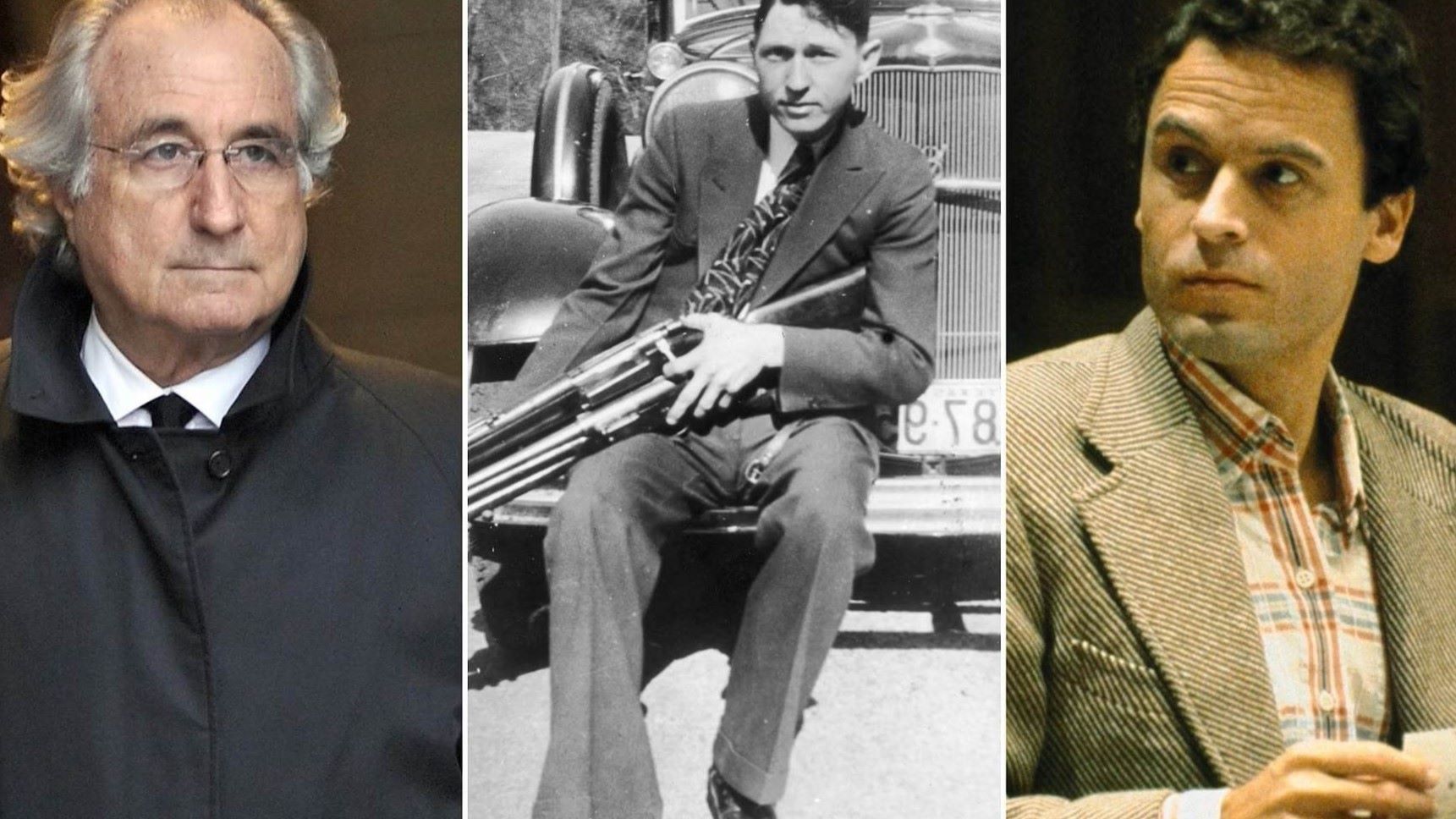
Psychopaths have always fascinated and terrified us. These individuals, often devoid of empathy and remorse, have left indelible marks on history. But who are these infamous figures, and what makes them tick? From notorious serial killers to cunning con artists, the world has seen its share of famous psychopaths. Understanding their behaviors and actions can provide insights into the darker corners of the human mind. In this post, we'll delve into 35 intriguing facts about some of the most well-known psychopaths. Brace yourself for a chilling journey through the lives of those who have shocked and horrified society.
Key Takeaways:
- Psychopaths come in various forms, from notorious serial killers to influential leaders and even fictional characters. Their lack of empathy and manipulative behavior have left a lasting impact on history and pop culture.
- Psychopathy isn't limited to criminals; it can also be found in the corporate world and even the medical field. Understanding the traits of psychopaths can help prevent and address their harmful actions.
Notorious Psychopaths in History
Psychopaths have fascinated and horrified people for centuries. Their lack of empathy and often violent tendencies make them subjects of endless study and speculation. Here are some chilling facts about famous psychopaths.
-
Ted Bundy: Known for his charm and intelligence, Bundy confessed to 30 homicides across seven states in the 1970s. His actual victim count remains unknown.
-
Jeffrey Dahmer: Also known as the Milwaukee Cannibal, Dahmer murdered 17 young men and boys between 1978 and 1991. He was notorious for his gruesome acts of necrophilia and cannibalism.
-
John Wayne Gacy: This "Killer Clown" was convicted of murdering 33 young men and boys in the 1970s. He often lured his victims with the promise of construction work or by posing as a police officer.
-
Aileen Wuornos: A rare female serial killer, Wuornos was convicted of murdering seven men in Florida between 1989 and 1990. She claimed her victims had either raped or attempted to rape her while she was working as a prostitute.
-
Richard Ramirez: Known as the "Night Stalker," Ramirez terrorized Los Angeles in the mid-1980s with a series of home invasions, rapes, and murders. He was eventually convicted of 13 counts of murder.
Psychopaths in Politics and Leadership
Psychopathy isn't limited to serial killers. Some historical leaders have also exhibited psychopathic traits, often leading to devastating consequences.
-
Adolf Hitler: The dictator responsible for the Holocaust and World War II, Hitler's actions led to the deaths of millions. His lack of empathy and grandiose sense of self are classic psychopathic traits.
-
Joseph Stalin: Stalin's reign over the Soviet Union was marked by widespread purges, forced labor camps, and mass executions. His paranoia and ruthlessness fit the profile of a psychopath.
-
Saddam Hussein: The former Iraqi dictator was known for his brutal regime, which included torture, mass killings, and the use of chemical weapons against civilians.
-
Kim Jong-il: The North Korean leader maintained an iron grip on his country through fear and propaganda. His regime was responsible for widespread human rights abuses and famine.
-
Mao Zedong: The founder of the People's Republic of China, Mao's policies led to the deaths of millions through famine, forced labor, and political purges.
Psychopaths in Pop Culture
Fictional psychopaths have also captured the public's imagination, often becoming iconic characters in literature and film.
-
Hannibal Lecter: Created by author Thomas Harris, Lecter is a brilliant psychiatrist and cannibalistic serial killer. His character has been portrayed by Anthony Hopkins in the film "The Silence of the Lambs."
-
Patrick Bateman: The protagonist of Bret Easton Ellis's novel "American Psycho," Bateman is a wealthy New York City investment banker with a dark side. His character was famously portrayed by Christian Bale in the film adaptation.
-
Norman Bates: Inspired by real-life murderer Ed Gein, Bates is the main character in Robert Bloch's novel "Psycho." Alfred Hitchcock's film adaptation made Bates an enduring figure in horror.
-
The Joker: Batman's arch-nemesis, the Joker, is a chaotic and unpredictable psychopath. Various actors, including Heath Ledger and Joaquin Phoenix, have brought this character to life on screen.
-
Annie Wilkes: The antagonist in Stephen King's novel "Misery," Wilkes is a former nurse who holds her favorite author captive. Kathy Bates's portrayal of Wilkes in the film adaptation earned her an Academy Award.
Psychopaths in the Business World
Some individuals in the corporate world have also exhibited psychopathic traits, often leading to unethical behavior and scandal.
-
Bernie Madoff: The mastermind behind the largest Ponzi scheme in history, Madoff defrauded thousands of investors out of billions of dollars. His lack of remorse and manipulative behavior are characteristic of psychopathy.
-
Elizabeth Holmes: The founder of Theranos, Holmes was convicted of fraud for misleading investors and patients about the capabilities of her company's blood-testing technology.
-
Kenneth Lay: The CEO of Enron, Lay was involved in one of the biggest corporate scandals in history. His actions led to the company's collapse and the loss of thousands of jobs.
-
Jeff Skilling: Another key figure in the Enron scandal, Skilling's aggressive and unethical business practices contributed to the company's downfall.
-
Martin Shkreli: Known as "Pharma Bro," Shkreli gained notoriety for raising the price of a life-saving drug by 5,000%. His lack of empathy and manipulative behavior are typical of psychopathy.
Psychopaths in History
Historical figures have also exhibited psychopathic traits, often leading to acts of extreme violence and cruelty.
-
Gilles de Rais: A 15th-century French nobleman, de Rais was convicted of murdering hundreds of children. His sadistic behavior and lack of remorse are hallmarks of psychopathy.
-
Elizabeth Báthory: Known as the "Blood Countess," Báthory was accused of torturing and killing hundreds of young girls in the late 16th and early 17th centuries.
-
Vlad the Impaler: The inspiration for Dracula, Vlad was a 15th-century Romanian prince known for his brutal methods of punishment, including impalement.
-
Nero: The Roman Emperor Nero is infamous for his cruelty and excesses. He is believed to have started the Great Fire of Rome and persecuted Christians.
-
Ivan the Terrible: The first Tsar of Russia, Ivan was known for his violent outbursts and brutal treatment of his enemies.
Psychopaths in Modern Times
Even in recent years, individuals with psychopathic traits have made headlines for their shocking actions.
-
Anders Breivik: In 2011, Breivik carried out a mass shooting in Norway, killing 77 people. His lack of empathy and grandiose sense of self are typical of psychopathy.
-
Luka Magnotta: A Canadian murderer, Magnotta gained notoriety for killing and dismembering a Chinese student in 2012. He filmed the murder and posted the video online.
-
Jodi Arias: Convicted of murdering her ex-boyfriend in 2008, Arias's manipulative behavior and lack of remorse are characteristic of psychopathy.
-
Chris Watts: In 2018, Watts murdered his pregnant wife and two young daughters. His ability to lie convincingly and lack of empathy fit the profile of a psychopath.
-
Nikolas Cruz: The perpetrator of the 2018 Parkland school shooting, Cruz killed 17 people. His lack of remorse and violent tendencies are typical of psychopathy.
Psychopaths in the Medical Field
Some medical professionals have also exhibited psychopathic traits, often leading to horrific acts of violence.
-
Harold Shipman: A British doctor, Shipman is believed to have killed at least 250 of his patients over two decades. His lack of empathy and manipulative behavior are characteristic of psychopathy.
-
Michael Swango: An American physician, Swango was convicted of murdering several patients. He is suspected of killing up to 60 people.
-
Jane Toppan: A nurse in the late 19th and early 20th centuries, Toppan confessed to killing at least 31 patients. She claimed to have derived sexual pleasure from their deaths.
-
H.H. Holmes: One of America's first serial killers, Holmes built a "Murder Castle" in Chicago, where he lured and killed his victims. His lack of remorse and manipulative behavior are typical of psychopathy.
-
Charles Cullen: A nurse who confessed to killing at least 40 patients, Cullen's actual victim count may be much higher. His lack of empathy and manipulative behavior fit the profile of a psychopath.
Final Thoughts on Famous Psychopaths
Understanding famous psychopaths helps us grasp the complexities of human behavior. These individuals, often marked by charm, manipulation, and lack of empathy, have left significant marks on history. From serial killers to notorious leaders, their actions remind us of the darker sides of humanity. While it's fascinating to learn about their lives, it's also crucial to remember the victims and the impact on society. By studying these figures, we gain insights into mental health, criminal behavior, and the importance of early intervention. Knowledge about psychopaths isn't just about morbid curiosity; it's about better understanding the human mind and preventing future tragedies. Stay curious, stay informed, and always seek to understand the deeper layers of human nature.
Frequently Asked Questions
Was this page helpful?
Our commitment to delivering trustworthy and engaging content is at the heart of what we do. Each fact on our site is contributed by real users like you, bringing a wealth of diverse insights and information. To ensure the highest standards of accuracy and reliability, our dedicated editors meticulously review each submission. This process guarantees that the facts we share are not only fascinating but also credible. Trust in our commitment to quality and authenticity as you explore and learn with us.


